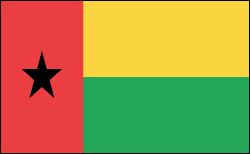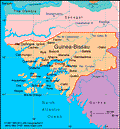Guinea-Bissau | Facts & Information

- Guinea-Bissau Profile
- History
- News and Current Events
Facts & Figures
-
President: José Mário Vaz (2014)
Prime Minister: Baciro Djá (2015)
Land area: 10,811 sq mi (28,000 sq km); total area: 13,946 sq mi (36,120 sq km)
Population (2014 est.): 1,693,398 (growth rate: 1.93%); birth rate: 33.83/1000; infant mortality rate: 90.92/1000; life expectancy: 49.87
Capital and largest city (2011 est.): Bissau, 423,000
Monetary unit: CFA Franc
National name: Républica da Guiné-Bissau
Languages: Portuguese (official), Crioulo, African languages
Ethnicity/race: African 99% (Balanta 30%, Fula 20%, Manjaca 14%, Mandinga 13%, Papel 7%), European and mulatto less than 1%
Religions: Islam 50%, indigenous beliefs 40%, Christian 10%
National Holiday: Independence Day, September 24
Literacy rate: 55.43% (2011 est.)
Economic summary: GDP/PPP (2013 est.): $2.005 billion; per capita $1,200. Real growth rate: 3.5%. Inflation: 1.9%. Unemployment: n.a. Arable land: 8.31%. Agriculture: rice, corn, beans, cassava (tapioca), cashew nuts, peanuts, palm kernels, cotton; timber; fish. Labor force: 632,700 (2007); agriculture 82%, industry and services 18% (2000 est.). Industries: agricultural products processing, beer, soft drinks. Natural resources: fish, timber, phosphates, bauxite, clay, granite, limestone, unexploited deposits of petroleum. Exports: $147.6 million (2013): fish, cashew nuts, shrimp, peanuts, palm kernels, sawn lumber. Imports: $206.4 million (2013): foodstuffs, machinery and transport equipment, petroleum products. Major trading partners: India, Portugal, Senegal, U.S., China, Togo, Nigeria (2012).
Communications: Telephones: main lines in use: 5,000 (2012); mobile cellular: 1.1 million (2012). Broadcast media: One state-owned TV station and a second station, Radio e Televisao de Portugal (RTP) Africa, is operated by Portuguese public broadcaster (RTP); 1 state-owned radio station, several private radio stations, and some community radio stations; multiple international broadcasters are available (2007). Internet hosts: 90 (2012). Internet users: 37,100 (2009).
Transportation: Railways: 0 km. Highways: total: 3,455 km; paved: 965 km; unpaved: 2,490 km (2002). Waterways: rivers are navigable for some distance; many inlets and creeks give shallow-water access to much of interior (2009). Ports and harbors: Bissau, Buba, Cacheu, Farim. Airports: 8 (2013).
International disputes: in 2006, political instability within Senegal's Casamance region resulted in thousands of Senegalese refugees, cross-border raids, and arms smuggling into Guinea-Bissau.









